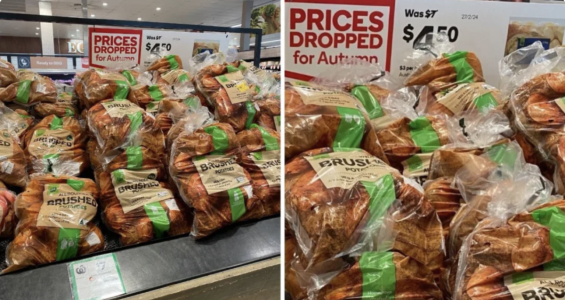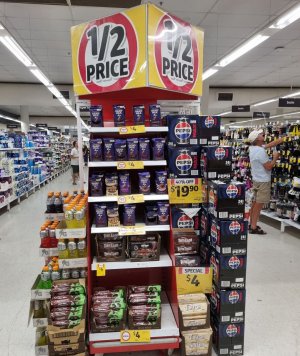Customer slams Woolworths for deceptive signage: ‘Another shonky tactic’
By
Seia Ibanez
- Replies 22
As we navigate the aisles of our local supermarkets, we trust that the signs above our heads guide us to the best deals and freshest produce.
However, a recent incident at a Woolworths in Ipswich, Queensland, has raised eyebrows and questions about the integrity of in-store signage and whether customers are being misled into paying more than they should.
A vigilant shopper noticed something amiss when she saw a large display of 4kg bags of brushed potatoes.
Above them hung a sign proclaiming, 'Prices Dropped for Autumn', with the enticing offer, 'Was $7, now $4.50’.

But upon closer inspection, the sign, which featured an image of a different product, actually referred to a smaller 1.5kg pack of mashing potatoes located further down the aisle.
These were indeed priced at $4.50, while the larger bags of brushed potatoes remained at $7.
The shopper who brought this to light expressed her frustration online, stating, ‘Legit complaint. Have people noticed that Woolworths has a practice of displaying a price for an item that is irrelevant to the item it sits above?’
'Another way Woolworths takes advantage of customers. I see this advertising all the time. Poor form Woolworths.'
Woolworths, when approached for comment, chose to remain silent on the matter.
Sales tactics and marketing strategies are under scrutiny as the Australian Competition and Consumer Commission (ACCC) embarks on a year-long inquiry into supermarket pricing practices.
With the former Woolies CEO Brad Banducci and Coles CEO Leah Weckert soon to face a Senate inquiry, the spotlight is on whether these giants have unfairly profited during a cost-of-living crisis.
In the meantime, reactions on social media have been mixed, with some customers accusing Woolworths of intentional deception.
'If it’s intentional, then it’s clearly deceptive,' one customer remarked.
‘I think they bank on people being in a rush and not reading the sales ticket properly, another shonky tactic,’ another said.
A third added that the $7 price tag was a ‘rip-off’.
Phillip Portman of Compare the Market said that the average household was spending $193 on their weekly grocery shop, and price increases were due to several issues, such as weather events and various transportation and labour costs.

To help reduce your grocery bills, here are some top tips you can do:

Have you encountered similar deceptive practices or have tips on how to shop smarter? Share your experiences and advice in the comments below!
However, a recent incident at a Woolworths in Ipswich, Queensland, has raised eyebrows and questions about the integrity of in-store signage and whether customers are being misled into paying more than they should.
A vigilant shopper noticed something amiss when she saw a large display of 4kg bags of brushed potatoes.
Above them hung a sign proclaiming, 'Prices Dropped for Autumn', with the enticing offer, 'Was $7, now $4.50’.

The sign indicating a ‘$4.50 price drop’ applied to another item instead of the brushed potatoes. Credit: Facebook
But upon closer inspection, the sign, which featured an image of a different product, actually referred to a smaller 1.5kg pack of mashing potatoes located further down the aisle.
These were indeed priced at $4.50, while the larger bags of brushed potatoes remained at $7.
The shopper who brought this to light expressed her frustration online, stating, ‘Legit complaint. Have people noticed that Woolworths has a practice of displaying a price for an item that is irrelevant to the item it sits above?’
'Another way Woolworths takes advantage of customers. I see this advertising all the time. Poor form Woolworths.'
Woolworths, when approached for comment, chose to remain silent on the matter.
Sales tactics and marketing strategies are under scrutiny as the Australian Competition and Consumer Commission (ACCC) embarks on a year-long inquiry into supermarket pricing practices.
With the former Woolies CEO Brad Banducci and Coles CEO Leah Weckert soon to face a Senate inquiry, the spotlight is on whether these giants have unfairly profited during a cost-of-living crisis.
In the meantime, reactions on social media have been mixed, with some customers accusing Woolworths of intentional deception.
'If it’s intentional, then it’s clearly deceptive,' one customer remarked.
‘I think they bank on people being in a rush and not reading the sales ticket properly, another shonky tactic,’ another said.
A third added that the $7 price tag was a ‘rip-off’.
Phillip Portman of Compare the Market said that the average household was spending $193 on their weekly grocery shop, and price increases were due to several issues, such as weather events and various transportation and labour costs.
Tip
To help reduce your grocery bills, here are some top tips you can do:
- Use smaller trolleys to prevent overfilling with non-essentials.
- Shop alone to avoid pressure from companions, particularly children.
- Plan your meals before you shop to avoid impulse buys.
- Be strategic with loyalty programs. Taking a break from them can lead to better bonus point deals upon your return.
Key Takeaways
- Woolworths has been accused of misleading customers with deceptive signage over a display of potatoes in an Ipswich store.
- A customer highlighted that price drop signs appeared to be placed incorrectly, causing confusion over which item the discount applied to.
- Woolies declined to comment when approached over a wider discussion on sales tactics and rising grocery prices.
- Tips for savvy shopping include avoiding aisle deals, using smaller trolleys, shopping alone, and being disloyal to loyalty programs to save money on groceries.








